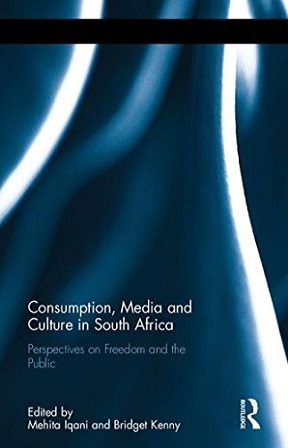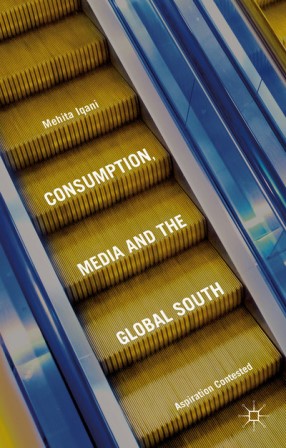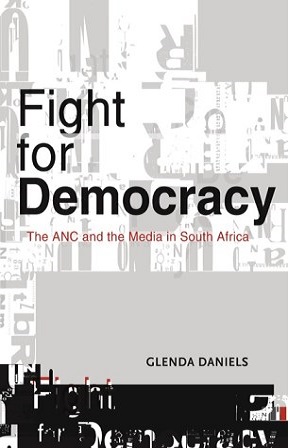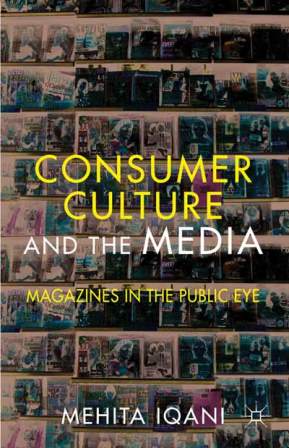-
Consumption, Media and Culture in South Africa: Perspectives on Freedom and the Public
edited by Mehita Iqani and Bridget Kenny, Routledge (2016)
This book is the first of its kind to bring together a collection of critical scholarly work on consumer culture in South Africa, exploring the cultural, political, economic, and social aspects of consumption in post-Apartheid society.
From sushi and Japanese diplomacy to Queen Sophie's writhing gown, from middle class Sowetan golfers to an indebted working class citizenry, from wedding websites to wedding nostalgia, from the liberation of consuming to the low wage labour of selling, the chapters in this book demonstrate a variety of themes, showing that to start with consumption, rather than ending with it, allows for new insights into long-standing areas of social research. By mapping, exploring and theorizing the diverse aspects of consumption and consumer culture, the volume collectively works towards a fresh set of empirically rooted conceptual commentaries on the politics, economics, and social dynamics of modern South Africa. This effort, in turn, can serve as a foundation for thinking less parochially about neoliberal power and consumer culture.
On a global scale, studying consumption in South Africa matters because in some ways the country serves as a microcosm for global patterns of income inequality, race-based economic oppression, and hopes for the material betterment of life. By exploring what consumption means on the 'local' scale in South Africa, the possibility arises to trace new global links and dissonances. This book was originally published as a special issue of Critical Arts.
-
Satanism and Family Murder in Late Apartheid South Africa: Imagining the end of Whiteness
by Nicky Falkof, Palgrave MacMillan (2015)
In the last years of apartheid, white South African society found itself in the grip of previously unimaginable social and political change, which sometimes manifested in morbid cultural symptoms. This book considers two of those symptoms, a pair of matched moral panics that appeared in the contemporary media and in popular literature. It argues that excessive reactions to the apparent threat posed by a cult of white Satanists, never proven to exist, and to a so-called epidemic of white family murder reveal important truths about fear, violence and resistance, as well as fragmentations within the poles of white South African identity: nationalism, gender, history, the family, even whiteness itself. Together, the Satanism scare and the family murder 'epidemic' draw a compelling picture of the psychic landscape of white culture at the end of apartheid, revealing both pathological responses to social change and the brutalising effects that apartheid had on those who benefited from it most.
-
Consumption, Media and the Global South: Aspiration Contested
by Mehita Iqani, Palgrave MacMillan (2015)
What does consumption in the global south signify, and how are its complexities communicated in media discourses? Consumption, Media and the Global South presents original research examining key themes in the ways in which consumption in the global south – by elites, the middle classes, and the poor – is discursively constructed in media texts. With the global triumph of capitalist economies and neoliberal values, consumption is increasingly viewed by populations in the global south as both a right to which they are denied access, and once accessed as evidence of an improved life. The ways in which this debate plays out on the stage of the media is an important element of the picture. This book looks at the media representation of consumer culture in Africa, China, Brazil and India through case studies ranging from celebrity selfies, to travel websites, news reports and documentary film.
-
Fight for Democracy: The African National Congress and the Media in South Africa
by Glenda Daniels, Wits University Press (2012)
Fight for Democracy is a penetrating and critical scrutiny of the ANC's treatment of the print media since the inception of democracy in 1994. In this book, Glenda Daniels does not hide behind a veil of detachment, but instead makes a passionate argument for the view that newspapers and journalists play a significant role in the deepening of democratic principles. Daniels' study goes to the heart of current debates and asks why the ANC, given its stated commitment to the democratic objectives of the Constitution, is so ambivalent about the freedom of the media. What would be the consequences of a revised media policy on democracy in South Africa, and at what cost to freedom of expression? Daniels examines the pattern of paranoia that has crept into public discourse about the media and the ANC, and the conflictual relationship between the two. She argues that the ANC's understanding of democracy, transformation and development entails (amongst other things) the rallying of the nation behind its leadership as the premier liberation movement and democratically elected representative of the majority while morally coercing black journalists and professionals into loyalty. Daniels challenges the dominant ANC view that journalists are against transformation and that they take instruction from the owners of the media houses; in short that they are 'enemies of the people'. Fight for Democracy is a timely publication in the context of the impending clampdown on media freedom and the twin threats of the Protection of State Information Bill (Secrecy Bill) and the Media Appeals Tribunal, both of which signify closures in South Africa's democracy. Written in a polemical style, this is a work of activism that will be essential reading for the informed public as well as those working in Journalism and Media Studies. It should interest all democrats, members of political organisations as well as academics and Right2Know activists, locally and internationally.
-
Radio in Africa: Publics, Cultures, Communities
edited by Dina Ligaga, Liz Gunner and Dumisani Moyo, Wits University Press (2012)
Radio has been called 'Africa's medium'. Its wide accessibility is a result of a number of factors, including the liberalisation policies of the 'third wave' of democracy and its ability to transcend the barriers of cost, geographical boundaries, the colonial linguistic heritage and low literacy levels. This sets it apart from other media platforms in facilitating political debate, shaping identities and assisting listeners as they negotiate the challenges of everyday life on the continent.
Radio in Africa breaks new ground by bringing together essays on the multiple roles of radio in the lives of listeners in Anglophone, Lusophone and Francophone Africa. Some essays turn to the history of radio and its part in the culture and politics of countries such as Angola and South Africa. Others – such as the essay on Mali, gender and religion – show how radio throws up new tensions yet endorses social innovation and the making of new publics. A number of essays look to radio's current role in creating listening communities that radically shift the nature of the public sphere. Essays on the genre of the talk show in Ghana, Kenya and South Africa point to radio's role in creating a robust public sphere. Radio's central role in the emergence of informed publics in fragile national spaces is covered in essays on the Democratic Republic of Congo and Somalia. The book also highlights radio's links to the new media, its role in resistance to oppressive regimes such as Zimbabwe, and points in several cases – for example in the essay on Uganda – to the importance of African languages in building modern communities that embrace both local and global knowledge.
-
Consumer Culture and the Media: Magazines in the Public Eye
by Mehita Iqani, Palgrave MacMillan (2012)
Consumer culture is synonymous with westernised societies. How did this particular ethic come to achieve so much success? This book argues that one reason is the seductive way in which it is promoted through the media. To demonstrate this, the book provides a detailed analysis of the case study of consumer magazine covers and argues that the ways magazines are displayed and sold in retail spaces, the literal glossiness of the texts, and the intertwined messages about sexiness, commodities and self-identity communicated by them combine to create a powerful and seductive advertisement for consumer culture. These strategies are not taken for granted, but questioned and put into the context of bigger scholarly debates about 'the public', 'power' and identity in neoliberal societies.






